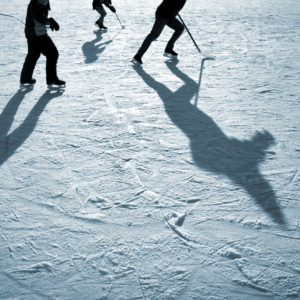
Extinction is a big word.
It really is — the average word in the English language is five characters long. But it’s not the size of a ten-letter word that has me wistful, it’s the magnitude of the loss when something ceases to exist.
The outdoor ice rink is to a Canadian childhood what the rear foot is to the front as you walk. It’s how you move on.
I was fortunate to have a rink in my backyard. It’s where my cousins who lived across the street and I learned to skate. We taught ourselves as our fathers never grew up ice skating, what with the ocean refusing to freeze over in their native Calabria. But what our fathers lacked in experience, they made up for in ambition and resourcefulness, and every December through March, they ran a hose from the basement cold room window of our house to the snow-packed driveway that lined the south end of the property, so we could learn the national winter pastime of their adoptive country.
Emphasis on “learn.” Statistically, your classic average word, but more to the point, winter used to be an education.
We pushed ourselves, challenged our limitations, hardened our resolve. We put our bodies through pain, voluntarily. Played ice hockey until we couldn’t feel our toes and tackle football in the snow hoping we’d get nailed to feel something, anything.
We built snow forts and tunnels, and debated over the pecking order: who were the engineers, the scroungers, the builders. We discerned which neighbourhood kids were our friends and which we strictly needed to be friendly with.
We hurt others’ feelings when picking teams and licked our wounds when picked last. We argued over who would be Lafleur, Mahovlich, Cournoyer, then put everything aside when the ice surface needed clearing, advancing as one, shoulder to shoulder, shovel to shovel.
There’s a photograph of us posing in the backyard rink. My cousin Tony inquired about it some years ago, and I’ve searched everywhere, to no avail. Gone extinct, perhaps, like the outdoor ice rinks slowly melting from of our lives, trickling into artifacts of a bygone era we’ll talk about and remember fondly, like no-shopping Sundays.
Thankfully, climate change can’t get to the memories frozen deep inside my head. I might occasionally picture us differently from left to right, but we’re unmistakably there, all four of us, side-by-side on the ice, facing the house, two bare apple trees framing the shot.
Spray a fresh coat of water from time to time, and the memories never dissolve.